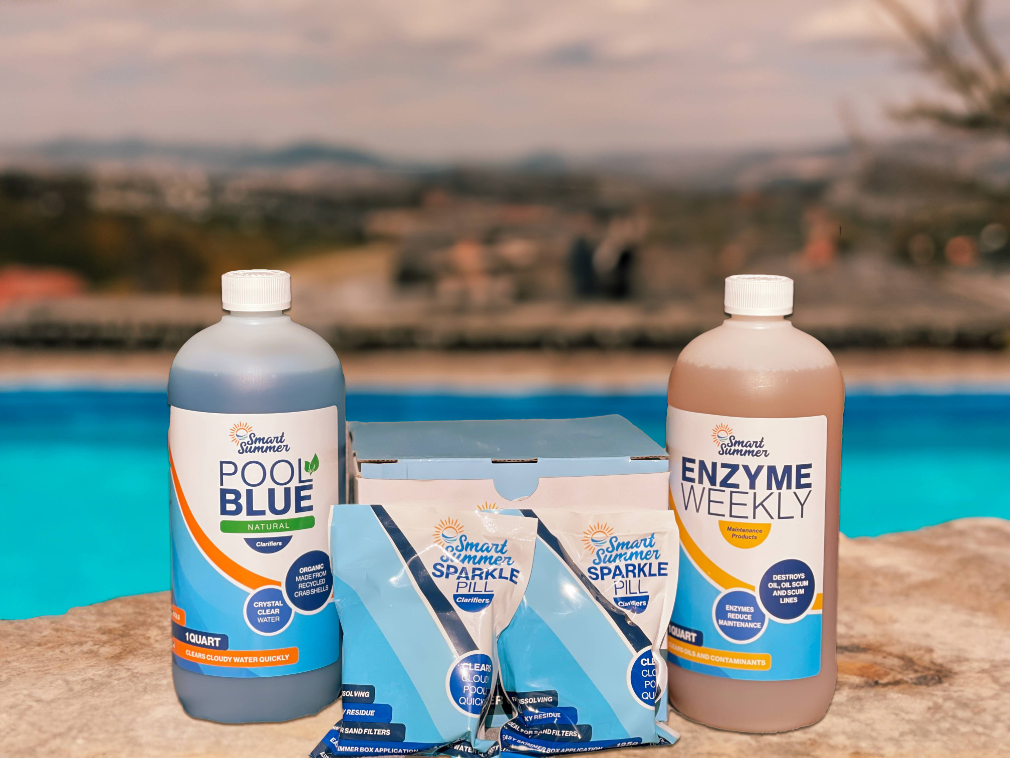Frequently Asked Questions
Welcome to the Smart Summer FAQ! This is here to help you find answers to your questions faster. Feel free to contact us via the contact page with any additional questions you might have!
How is Smart Summer's clarifier different from others?
Unlike many popular brands that are oil-based, our clarifier is an all-natural chitosan formula that actually coagulates oil. The more clarifier you add the better it works! You cannot overdose it, which isn't true with the oil based clarifiers out there.
Chitosan clarifiers work great and are there to help free up chlorine! Chlorine enhances chitosan to work at a fast pace making your pool beautiful in no time! It's a mutual relationship.
Why do I need a phosphate remover?
Phosphates are a key growth nutrient for algae. So, having a phosphate remover is going to be super important in proactively removing algae from your pool. You have to eliminate the food source!
Our Phosphate 9000 is the strongest phosphate remover in the industry and if used consistently, will help eliminate those recurring algae blooms. Keep in mind - every algae bloom that does not occur then frees up your chlorine to do its best work!
Note: We will be adding algaecide to our shop in the future. This is a great tool to rid your pool of algae if its gone a bit too far!
Will you ever sell chlorine?
Most likely not, it is a hassle to store and regulate! A lot of the US supply comes from overseas, making the supply chain tedious. At Smart Summer we like to stay in our lane so to speak - we belong with specialty chemicals!
Chlorine is essential and is a commodity that is sold everywhere. We enhance the power of chlorine, we just don’t sell it.
Do Smart Summer kits and products work with both chlorine and saltwater pools?
Yes. Saltwater pools generate chlorine via a salt-chlorine generator (SCG), so they remain chemically equivalent to chlorine pools.
That means smart pool kits (chemical treatments, clarifiers, enzymes, phosphate removers, etc.) designed for chlorine pools also work seamlessly in saltwater pools.
Do dosage adjustments depend on pool type?
Not significantly based on chlorine vs. saltwater. Dosage primarily depends on water volume and bather load. Most smart startup kits are dosed by gallon capacity!
Saltwater pools maintain steady, automated chlorine levels, but pH typically rises faster due to the SCG, so you may rely more on pH reducers (e.g., muriatic acid) than in traditional chlorine pools.
Which is more expensive to maintain - chlorinated or saltwater?
Generally we have found the following to be true:
- Saltwater pools have higher upfront costs (~$1,400–$2,500 for SCG installation), but lower annual chemical costs ($30–60/year for salt).
- Chlorine pools cost less to install, but you’ll spend ~$300–800/year on chlorine tablets and chemicals.
- Long–term: Saltwater can save ~$240–770 annually compared to chlorine options.
Which is easier to maintain - chlorinated or saltwater?
Saltwater systems automate chlorine production, meaning less frequent manual chlorine dosing, but you'll need to monitor and clean the SCG cell every few months and manage rising pH.
Chlorine pools require more routine additions—tablets, shocks, etc.—but involve simpler equipment and fewer specialized parts.
Does a chlorinated or salt water pool last longer?
Both types can last 10–15+ years with proper care.
Saltwater can be more corrosive to metal fixtures, heaters, and natural stone if untreated, and SCG cells cost $300–600 to replace every 3–5 years.
With balanced pH, alkalinity, calcium hardness, and use of salt-resistant materials, both systems maintain durability. Overall longevity depends more on water balance and materials than sanitizer type.
Is a saltwater pool better for my skin?
Saltwater pools are gentler on the skin, eyes, and hair, offering a softer, silkier feel with fewer irritating chloramines.
Chlorine pools, especially if not well-balanced, can cause red eyes, dry skin, and swimsuit fading due to higher chemical concentrations.


